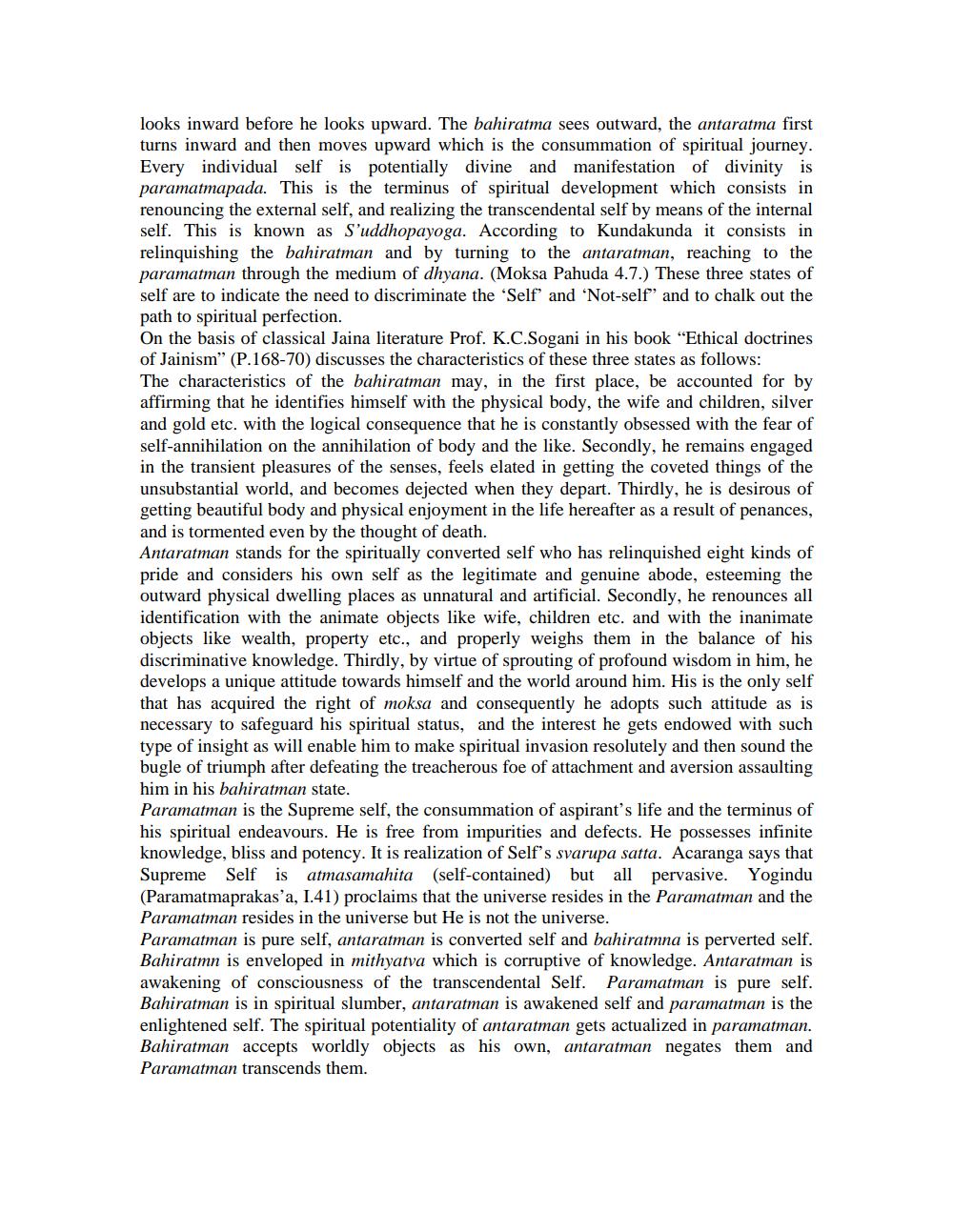Book Title: Concepts of Parmatma Antaratma Anatma in Philosophy of Dada Bhagwan Author(s): S R Bhatt Publisher: S R Bhatt View full book textPage 6
________________ looks inward before he looks upward. The bahiratma sees outward, the antaratma first turns inward and then moves upward which is the consummation of spiritual journey. Every individual self is potentially divine and manifestation of divinity is paramatmapada. This is the terminus of spiritual development which consists in renouncing the external self, and realizing the transcendental self by means of the internal self. This is known as S'uddhopayoga. According to Kundakunda it consists in relinquishing the bahiratman and by turning to the antaratman, reaching to the paramatman through the medium of dhyana. (Moksa Pahuda 4.7.) These three states of self are to indicate the need to discriminate the 'Self' and 'Not-self and to chalk out the path to spiritual perfection. On the basis of classical Jaina literature Prof. K.C.Sogani in his book "Ethical doctrines of Jainism" (P.168-70) discusses the characteristics of these three states as follows: The characteristics of the bahiratman may, in the first place, be accounted for by affirming that he identifies himself with the physical body, the wife and children, silver and gold etc. with the logical consequence that he is constantly obsessed with the fear of self-annihilation on the annihilation of body and the like. Secondly, he remains engaged in the transient pleasures of the senses, feels elated in getting the coveted things of the unsubstantial world, and becomes dejected when they depart. Thirdly, he is desirous of getting beautiful body and physical enjoyment in the life hereafter as a result of penances, and is tormented even by the thought of death. Antaratman stands for the spiritually converted self who has relinquished eight kinds of pride and considers his own self as the legitimate and genuine abode, esteeming the outward physical dwelling places as unnatural and artificial. Secondly, he renounces all identification with the animate objects like wife, children etc. and with the inanimate objects like wealth, property etc., and properly weighs them in the balance of his discriminative knowledge. Thirdly, by virtue of sprouting of profound wisdom in him, he develops a unique attitude towards himself and the world around him. His is the only self that has acquired the right of moksa and consequently he adopts such attitude as is necessary to safeguard his spiritual status, and the interest he gets endowed with such type of insight as will enable him to make spiritual invasion resolutely and then sound the bugle of triumph after defeating the treacherous foe of attachment and aversion assaulting him in his bahiratman state. Paramatman is the Supreme self, the consummation of aspirant's life and the terminus of his spiritual endeavours. He is free from impurities and defects. He possesses infinite knowledge, bliss and potency. It is realization of Self's svarupa satta. Acaranga says that Supreme Self is atmasamahita (self-contained) but all pervasive. Yogindu (Paramatmaprakas'a, 1.41) proclaims that the universe resides in the Paramatman and the Paramatman resides in the universe but He is not the universe. Paramatman is pure self, antaratman is converted self and bahiratmna is perverted self. Bahiratmn is enveloped in mithyatva which is corruptive of knowledge. Antaratman is awakening of consciousness of the transcendental Self. Paramatman is pure self. Bahiratman is in spiritual slumber, antaratman is awakened self and paramatman is the enlightened self. The spiritual potentiality of antaratman gets actualized in paramatman. Bahiratman accepts worldly objects as his own, antaratman negates them and Paramatman transcends them.Page Navigation
1 ... 4 5 6 7 8 9 10 11 12 13 14 15 16 17 18 19 20 21 22 23 24
